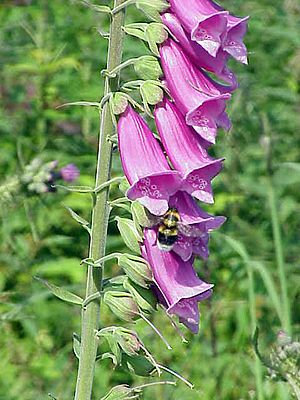Jonathan Stokes facts for kids
Jonathan Stokes (born around 1755 – died 30 April 1831) was an English doctor and a plant expert. He was part of a famous group called the Lunar Society in Birmingham. He was also one of the first doctors to use a heart medicine called digitalis.
Contents
Life and Work of Jonathan Stokes
Jonathan Stokes was likely born in Chesterfield, Derbyshire, around 1755. He went to medical school at the University of Edinburgh in 1778. He became a doctor in 1782.
He worked as a doctor in Stourbridge, Worcestershire. Besides his medical work, he loved studying plants. He collected many different plants and helped to list them all.
Working with William Withering
Stokes became friends with William Withering, who was also a doctor and a plant expert. Withering was a member of the important Lunar Society. Stokes joined this group too, from 1783 to 1788.
Stokes helped Withering with his famous book, An Account of the Foxglove and its Medical Uses (1785). Stokes wrote about the history of digitalis, which is a medicine made from the foxglove plant. He also shared details from six clinical trials. These were tests he did on patients with heart failure, using Withering's new treatment method.
Stokes helped spread knowledge about digitalis. He gave a talk about it to the Medical Society of Edinburgh in 1799. In 1788, he was chosen as an honorary member of the American Academy of Arts and Sciences.
Later Life and Contributions
In 1790, Stokes was one of the first 16 people to join the new Linnean Society of London. He also wrote letters to Carolus Linnaeus the Younger, who was a famous plant scientist.
Stokes spent the rest of his life working as a doctor in Chesterfield. He continued his scientific studies. He published two important books:
- A Botanical Materia Medica (1812)
- Botanical Commentaries (1830)
He passed away in Chesterfield on 30 April 1831. He was buried at St Mary's Church in Chesterfield. A plant called Stokesia cyanea (also known as Stokesia laevis) was named after him.
Disagreement with William Withering
Jonathan Stokes and William Withering worked together on several editions of Withering's plant book, The Botanical Arrangement of All the Vegetables Naturally Growing in Great Britain. However, they had a disagreement about how much Stokes had contributed to the second edition (1792).
Stokes felt his work was very important. He believed he should be seen as a co-author of the book. Withering disagreed with this. There was also a problem because Stokes did not return about 150 of Withering's valuable books. Withering had to take legal action to get them back. When the books were returned, some of them were damaged.
It is not fully clear why their friendship ended. However, Stokes's contributions to Withering's work were significant.
 | Victor J. Glover |
 | Yvonne Cagle |
 | Jeanette Epps |
 | Bernard A. Harris Jr. |


